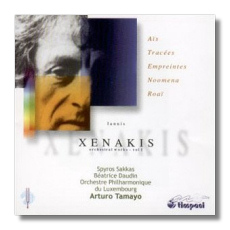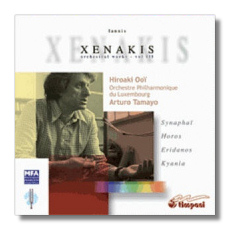
The Internet's Premier Classical Music Source
Related Links
- Xenakis Reviews
- Latest Reviews
- More Reviews
-
By Composer
-
Collections
DVD & Blu-ray
Books
Concert Reviews
Articles/Interviews
Software
Audio
Search Amazon
Recommended Links
Site News
 CD Review
CD Review
Iannis Xenakis

Œuvres pour grand orchestre
Volume 1
- Aïs, with amplified baritone voice & solo percussion
- Tracées
- Empreintes
- Noomena
- Roáï
Spyros Sakkas, baritone
Beatrice Daudin, percussion
Luxembourg Philharmonic Orchestra/Arturo Tamayo
Timpani 1C1057 2000 59:02


Volume 3
- Synaphaï (1969)
- Horos (1996)
- Eridanos (1972)
- Kyania (1990)
Hiroaki Ooï, piano
Luxembourg Philharmonic Orchestra/Arturo Tamayo
Timpani 1C1068 2002 64:16
[Volume 2 - 1C1062:
Amazon
- UK
- Germany
- Canada
- France
- Japan
- ArkivMusic
- CD Universe
]
[Volume 4 - 1C1084:
Amazon
- UK
- Germany
- Canada
- France
- Japan
- ArkivMusic
- CD Universe
]
Iannis Xenakis (1922-2001) lived just into our new century, having transformed the orchestra and how we listen to it as radically as Stravinsky and Ligeti during the last one.
Volume 3, the latest to be released of this admired series, consists of mature and late works - abrasive, tough music, astringent and exhilarating, but exhaustion could supervene if you tried to listen to these densely scored works straight through. No 'tunes' but a wealth of textural and rhythmic interest, often of mind-boggling complexity.
Synaphaï (a piano concerto, 1969) requires a soloist who can read ten staves simultaneously (one for each finger!) and Xenakis, reassuringly advises: "the pianist plays all the lines if he can"! The Japanese pianist Hiroaki Ooï sounds unfazed by his assignment and the whole thing is recommended to intrepid explorers; but do shut the window first.
I favour trying the two works from the '90s first; Horos and Eridanos share some material and the superimposition of orchestral blocs, varying from a single section to the whole orchestra. Computer manipulations are an essential tool for this former architect (a colleague of Le Corbusier) but he allows for aesthetic intuition to play a part in what reaches our ears; Xenakis has always been fascinated by undisciplined, 'chaotic' natural events. Most of the music is loud and with a full sonority, put over by this experienced team with complete conviction. There are also passages of welcome calm and stasis to be found within the maelstrom.
I cannot and will not attempt to describe these works in any detail; that is provided by John Tyler Tuttle in English and my favourite insert-note writer Harry Halbreich, who runs to seven pages in smallest type, in French; both writers make the strange assumption that purchasers and listeners will have scores as they do – it would be far more helpful if their annotations were to track timings instead of bar numbers!
Volume 1 of the same series also has Halbreich in French as chief guide, together with an essay in English by Nouritza Matossian, author of Iannis Xenakis (Kahn & Averill UK 1990), whose biographical notes are helpful for the ordinary listener. She says that Xenakis' music gives the impression that it has only just been composed and makes a claim, with some justice, that it gives the latter 20 C. A glimpse of the new millennium. That earlier CD may be a more attractive starting point for the inclusion of a vocal setting of passages from the Odyssey, featuring solo percussion and the remarkable Greek singer Spyros Sakkas, and for a broader representation of Xenakis' musical personality; "I am a classical Greek living in the twentieth century", he said.
Copyright © 2002, Peter Grahame Woolf




















